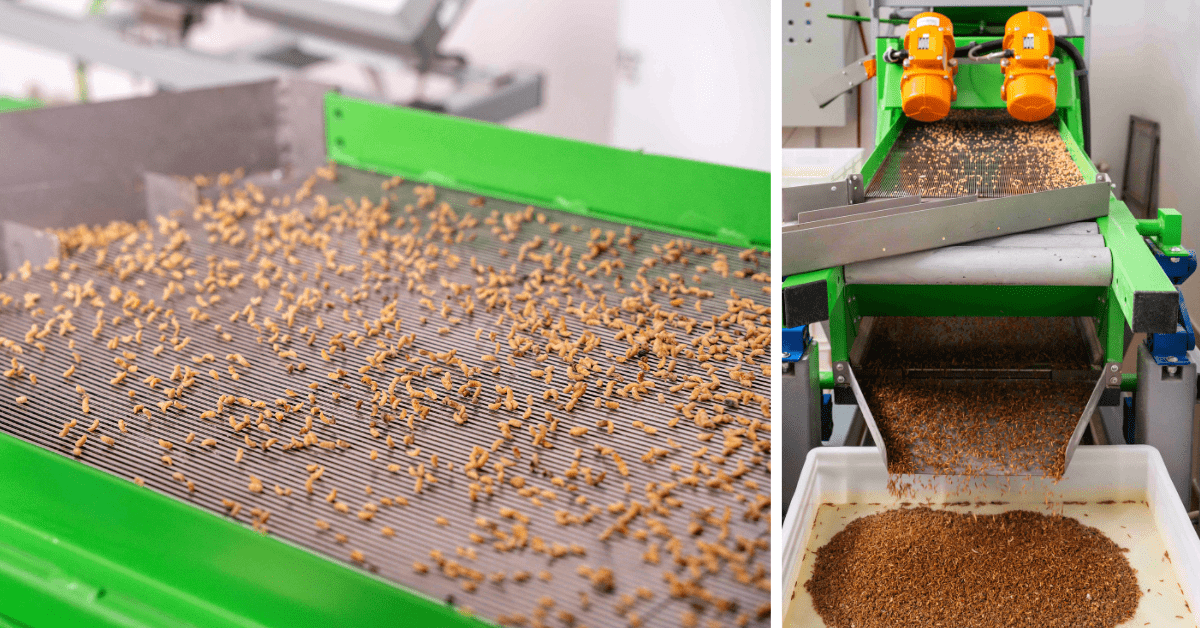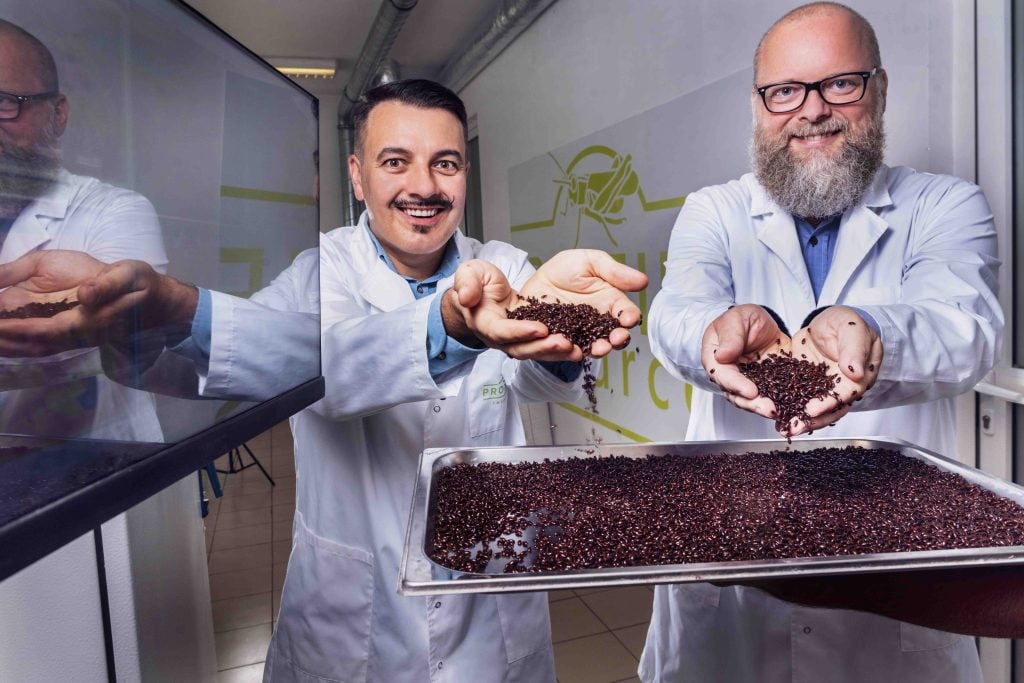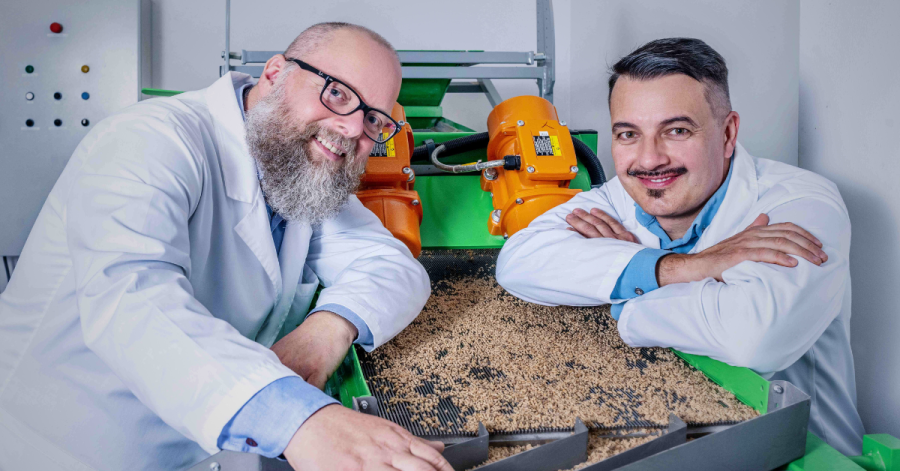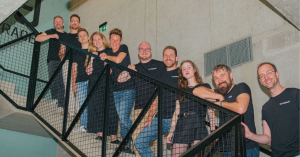As the demand for sustainable protein sources rises, insect farming is increasingly being recognized as a viable solution for both animal feed and human consumption. However, the market potential hasn’t been fully exploited due to the lack of an effective business model.
Polish company Proteine Resources aims to address these challenges with 25 years of experience in insect farming and their, as they claim – groundbreaking technology. Their prowess and ambition are in a good degree proved by their latest investment.
After the first round of €467k, the latest round for Proteine Resources, led by Polish SMOK Ventures, amounts to €1,4 million. In this round, Bitspiration Booster, a deep-tech VC fund and the first institutional investor in Proteine Resources, also reinvested.
How it all started?
Proteine Resources was founded in 2018 by Konrad Włodarczyk, who was inspired by his experience with breeding reptiles and amphibians, Bartłomiej Roszkowski, co-CEO of Proteine Resources, explained to The Recursive.
“Working closely with these animals, Konrad realized the critical role insects play in their diet. At that time, the insect protein industry was heavily reliant on the black soldier fly, which suffered from low protein quality, high operating costs, and steep investment barriers due to inefficient, labour-intensive production methods.”
Teaming up with Dominik Helbin, who was supplying live insects across Europe, they aimed to innovate in the insect protein sector by focusing on superior insect species and advanced feed formulations that would produce high-quality insect protein with nearly 70% protein content.

In 2024, Roszkowski joined the team to help Konrad elevate Proteine Resources to the next level. Although Dominik is no longer involved in day-to-day operations, he continues to support them with valuable insights and connections.
“Our mission has always been to produce top-quality insect protein efficiently and sustainably, overcoming the industry’s traditional challenges of low quality, high costs, and high investment requirements,” concluded Roszkowski.
Automated protein factories
One of Proteine Resources’ key innovations is its AI-driven monitoring system, which enhances efficiency in insect farming. By employing multispectral analysis powered by AI, the company can monitor environmental conditions, protein and nutrient content, and insect health in real-time.
This leads to higher efficiency, consistent product quality, and rapid scalability. For example, they claim they can breed insects in just 4 weeks, producing nearly 70% protein—significantly higher than competing products.
Roszkowski notes, “Thanks to AI, we can process large amounts of data in real-time, enabling immediate decision-making and process optimization.”
SMOK Ventures managing partner Borys Musielak also highlighted the scalability of Proteine Resources’ automated mini-factories, making their business model more promising than traditional protein production.
Trust in the team
Additionally, Musielak commented they highly value the excellent combination of the founders’ competencies:
“Konrad’s experience in the food-tech sector and Bartek’s experience in scaling enterprises, known from projects such as building the global success of Vue Storefront (now Alokai).”
Andrzej Targosz, General Partner at Bitspiration Booster, confirms that sentiment: “From the very beginning of our cooperation with Konrad, the founder of the company, we have seen enormous technological and business potential in Proteine Resources.”
Proteine Resources currently has a dedicated team of nine full-time members, including engineers, breeding technicians, and R&D professionals, all working towards their vision of sustainable insect protein production.
Path to scalability
Despite the team effort and significant progress, the journey has not been without challenges. The company spent nearly six years identifying the right insect species and optimizing feed formulations to meet their production goals.
“One of our first major challenges was identifying the right insect species that could meet our ambitious production goals,” said Włodarczyk. This involved extensive research and testing to find a species that was both efficient to farm and met the high-quality standards they had set.
“Once we secured the perfect species, the next step was developing and testing the optimal feed formulation. We experimented with dozens of feed recipes until we found the most effective one, which significantly enhanced the quality and performance of our insect protein.”
After establishing the ideal species and feed, they turned their focus to prototyping and designing the vision systems and facilities. “This process required extensive designing and redesigning over the years to ensure our systems were both efficient and scalable.”
And the job is still not done, pointed Włodarczyk. It’s a process of continuous improvements to the systems as they aim to develop tailored product applications to meet specific customer needs.
Proteine Resources’ unique proposition

The report launched at the UN Climate Change Conference (2023) finds that by 2050, meat and dairy alternatives could make up as much as half the global market for animal proteins. And insect farming is one of the complementary technologies addressing the growing demand for it.
However, cost, taste, and social and cultural acceptability are key barriers to these alternative sources of protein. For them to be produced in an environmentally sustainable way and production scaled up, low-carbon energy sources are vital.
Proteine Resources could have a good opportunity there, if they stick to their principle on zero waste and zero emissions. Besides that, their focus on specialized applications also sets them apart.
“Unlike our competitors, we focus on specialized applications such as hatching hens, starter feeds, veterinary-grade pet food, supplements, and products for hobbyists. This focus is driven by the superior quality and unique composition of our offerings.”
When it comes to monetization, they plan to grow through a franchise model, setting up automated insect farms near food processing plants and agricultural sites. In response, Proteine Resources is actively pursuing partnerships with larger food and agriculture companies to accelerate market entry.
“We already have multiple Letters of Intent from interested customers, and the demand for our products is about twenty times our current capacity,” Roszkowski shares.
Next up
The potential is there, but what is the plan? Here is what Protein Resources shared with The Recursive:
In 2024, they aim to triple production capacity and secure initial customer payments. By 2026, they will finalize factory construction, install advanced equipment, and grow their customer base. The launch of their first fully autonomous factory in Central and Eastern Europe is scheduled for 2027, expected to drive significant revenue growth.
“Looking ahead, we’re working on unique product formulations and applications tailored to solve our customers’ specific problems. While we’ve made significant progress, there’s still a lot to accomplish as we strive to innovate and meet the growing demand for sustainable insect protein,” concluded Roszkowski.
With a clear vision and a robust business model, Proteine Resources is well-positioned to contribute to the future of sustainable protein production. It definitely helps that they are also in advanced talks to secure additional financing from the European Innovation Council (EIC).







